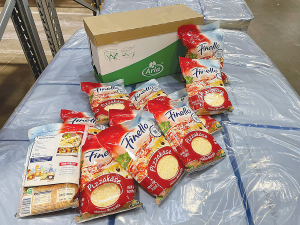Europe’s largest dairy co-operative to launch in 2026 as Arla Foods and DMK merge
The creation of Europe's largest dairy co-operative should be complete by early 2026.
 Using a pyrolysis process, the plastic is kept within the loop and recycled into new packaging instead of being burnt.
Using a pyrolysis process, the plastic is kept within the loop and recycled into new packaging instead of being burnt.
Plastic used for Arla's cheese production is finding new life in a large-scale test with German partner Südpack.
Using a pyrolysis process, the plastic is kept within the loop and recycled into new packaging instead of being burnt, reducing the overall need for virgin plastic as well as the carbon footprint.
At Rødkærsbro dairy in Denmark they produce mozzarella cheese. And as the cheese needs to mature in specially designed films for about two weeks that requires quite a heavy use of plastic. The plastic films need to be multi-layered for food safety reasons but this also means they cannot be recycled through mechanical recycling which is the industry standard across Europe. Therefore, the only option so far has been to send them to incineration after fulfilling their essential role in the production process.
Now, to achieve a higher grade of recycling, Arla is carrying out a large-scale test using pyrolysis to convert 80 tonnes of plastic waste a year into new packaging. The pyrolysis process converts plastic waste into oil by exposing it to very high temperatures in a controlled environment.
"Instead of sending our plastic films to incineration, resulting in a one-off energy gain, we recycle them and use the recycled material to create new packaging thus reducing the carbon footprint as well as the need for virgin fossil plastic," says lead packaging development manage at Arla Foods, Grane Maaløe.
Even if the plastic films were suitable for mechanical recycling, no process is currently available to bring the plastic into food contact material and as a result the films wouldn't be recycled as new food packaging but downcycled and used for something else and exiting the loop.
"Utilising the processing capabilities at our plant in Germany, we can ensure that the films produced for Arla's cheese maturing purposes do not exit the loop but instead are recycled into new packaging. A tonne of mixed plastic does not equal a tonne of new packaging but it does reduce the need for virgin plastic and it paves the way for increased investing in this infrastructure going forward," says business unit manager Dick Harlow from Südpack.
Factoring in the loss of the electricity and thermal energy that incineration delivers, and the negative impact of transporting the films from Denmark to Germany, the calculation still comes out in favour of pyrolysis when it comes to overall carbon emissions.
Per tonne of plastic waste handled, the full processing including the pyrolysis process emits up to 50% less than sending to incineration.
Arla and Südpack will be testing this new setup with 80 tonnes in 2023 before evaluating the results.
Legal controls on the movement of fruits and vegetables are now in place in Auckland’s Mt Roskill suburb, says Biosecurity New Zealand Commissioner North Mike Inglis.
Arable growers worried that some weeds in their crops may have developed herbicide resistance can now get the suspected plants tested for free.
Fruit growers and exporters are worried following the discovery of a male Queensland fruit fly in Auckland this week.
Dairy prices have jumped in the overnight Global Dairy Trade (GDT) auction, breaking a five-month negative streak.
Alliance Group chief executive Willie Wiese is leaving the company after three years in the role.
A booklet produced in 2025 by the Rotoiti 15 trust, Department of Conservation and Scion – now part of the Bioeconomy Science Institute – aims to help people identify insect pests and diseases.